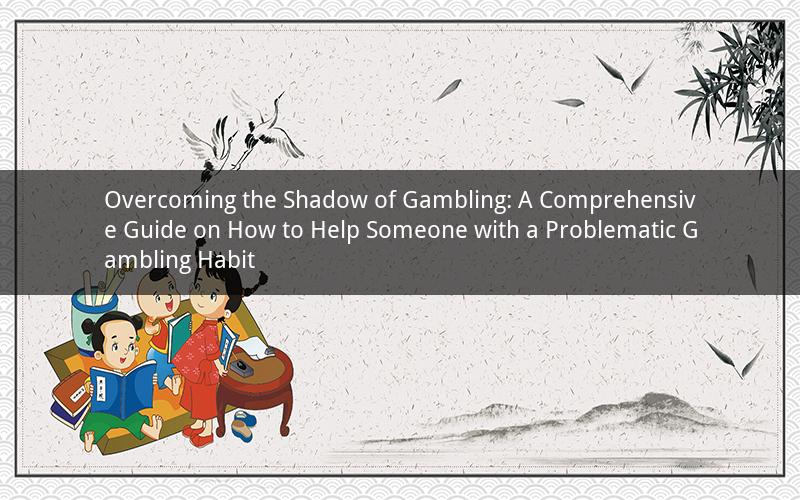
Introduction:
Gambling addiction, often referred to as a gambling problem, is a complex issue that affects individuals, families, and communities. It is crucial to recognize the signs of gambling addiction and understand how to help someone who is struggling with this habit. In this article, we will explore various strategies and resources to support individuals dealing with a gambling problem.
1. Identifying the Signs of a Gambling Problem
To effectively help someone with a gambling problem, it is essential to identify the signs and symptoms. These may include:
- Spending an excessive amount of time and money on gambling activities
- Feeling restless or irritable when unable to gamble
- Lying to family and friends about gambling habits
- Borrowing money to fund gambling activities
- Neglecting responsibilities due to gambling
2. Encouraging Open Communication
Open communication is the foundation for helping someone with a gambling problem. Here are some tips to foster a supportive environment:
- Approach the conversation with empathy and understanding
- Avoid judgment or criticism
- Listen actively and without interrupting
- Express your concern for their well-being
3. Encouraging Professional Help
Seeking professional help is crucial for individuals struggling with a gambling problem. Here are some options:
- Therapists specializing in addiction and mental health
- Gamblers Anonymous (GA) meetings
- Support groups for family members and friends of gamblers
4. Setting Boundaries and Limits
Setting boundaries and limits can help prevent further gambling behavior. Here are some suggestions:
- Establish a budget for gambling activities and stick to it
- Remove access to credit cards and online gambling platforms
- Set specific time limits for gambling sessions
- Encourage alternative hobbies and activities to occupy free time
5. Providing Emotional Support
Emotional support is vital during the recovery process. Here are some ways to offer assistance:
- Be patient and understanding during the recovery journey
- Offer encouragement and praise for progress
- Attend support group meetings with the individual
- Encourage participation in healthy coping mechanisms, such as exercise or mindfulness practices
6. Financial Management and Assistance
Gambling addiction often leads to financial difficulties. Here are some strategies to address this issue:
- Create a budget plan to manage debts and expenses
- Seek financial counseling or credit counseling services
- Consider seeking legal advice to address any financial disputes
- Encourage the individual to seek employment or vocational training to improve their financial situation
7. Encouraging a Healthy Lifestyle
A healthy lifestyle can contribute to the recovery process. Here are some recommendations:
- Encourage a balanced diet and regular exercise
- Promote adequate sleep and stress management techniques
- Encourage participation in social activities and hobbies
- Support the individual in seeking mental health treatment if needed
8. Aftercare and Continued Support
Recovery from a gambling problem is an ongoing process. Here are some ways to provide continued support:
- Encourage regular check-ins and follow-up sessions with professionals
- Attend support group meetings together
- Offer ongoing emotional support and encouragement
- Remain vigilant for any signs of relapse and address them promptly
Conclusion:
Helping someone with a gambling problem requires empathy, understanding, and a commitment to their recovery. By identifying the signs, encouraging open communication, seeking professional help, setting boundaries, providing emotional support, managing finances, promoting a healthy lifestyle, and offering continued support, you can play a significant role in their journey towards recovery.
Questions and Answers:
1. Q: How can I recognize if someone is struggling with a gambling problem?
A: Look for signs such as excessive time and money spent on gambling, lying about gambling habits, borrowing money, neglecting responsibilities, and feeling restless without gambling.
2. Q: What is the role of professional help in treating a gambling problem?
A: Professional help, such as therapists and support groups, can provide personalized guidance, coping strategies, and a supportive community for individuals struggling with a gambling problem.
3. Q: How can I help someone with a gambling problem set boundaries and limits?
A: Encourage them to establish a budget for gambling, remove access to credit cards and online gambling platforms, set time limits, and find alternative activities to occupy free time.
4. Q: What can I do to support someone during their recovery journey?
A: Offer emotional support, be patient, attend support group meetings together, encourage healthy coping mechanisms, and remain vigilant for any signs of relapse.
5. Q: How can I ensure continued support for someone with a gambling problem?
A: Regularly check in with them, encourage follow-up sessions with professionals, attend support group meetings together, offer emotional support, and be prepared to address any signs of relapse promptly.